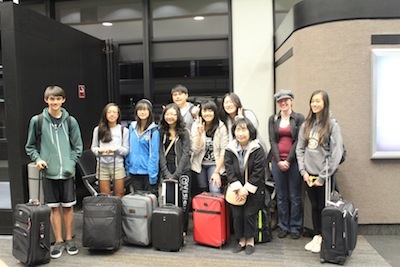Japanese teacher Keiko Howard wasn’t certain if she wanted to send students to the National Japan Bowl in Washington, D.C. The trip was long, and after her 15 years of experience with preparing students for the competition, she questioned the students’ availability to study given the workload from all their other activities. But senior Chi Yu (Julia) Liu — who had attended the competition two years prior — didn’t give up; she was convinced that she could prove the participants’ dedication.
Thanks to Liu’s persuasion, Howard agreed to send nine students from her Japanese classes to the National Japan Bowl. There was a list of criteria that Howard had made to ensure that the students she selected were ready for the extensive preparation ahead; the most important of which being that the students should be interested in Japanese culture and history, not just the thrill of competing.

Finally, it was settled. Sophomores Alyssa Hada, Sara Hsi and Tiffany Wong would compete at the second level, juniors Kevin Krause, Blake Nishimoto and Tasha Trinh at the third, and seniors Sze Chieh (Jessica) Chen, Erin Dowd and Liu at the fourth level.
The competition
The nine students took a flight to Washington, D.C where the competition was held from April 11 to April 12. With guidance from Howard and Liu, they placed tenth in levels two and three of the competition and first in the fourth level.
The National Japan Bowl is a competition run by the Japan-America Society, and has been held annually since 1992. The competition is divided into levels based on language proficiency and tests non-native speakers on Japanese culture, history and language. Competitors must first participate in a regional competition, where the top three finalists qualify for the national level. Within each level at the National Japan Bowl there are four rounds of elimination: two trivia-style tests, an interview and a three-part final round.
Due to the in-depth nature of the competition material, students were required to spend time studying outside of class to cover the extra information. They spent nearly every lunch period since November in Howard’s room preparing for the competition.
Keeping up with tradition
The Japanese 4 team managed to beat other top contenders from the district, including the reigning champions from Thomas Jefferson High School for Science and Technology in Virginia. The girls took home a first place title and won a free ten day trip to Japan to take place in late August, which they are currently planning with the Japan-America Society.
“[Chen] was keeping tabs of everyone’s score before the final round and we were tied until the last question with this private school where they train like no other for this competition,” Dowd said. “We beat them by one point.”
However, this is not the first year that a team from MVHS has placed at the National Japan Bowl. Since their first year at the competition nearly ten years ago, the teams have always managed to place in the top ten. At the most recent competition prior to this year, the Japanese 4 team also won first place.
According to Liu, the teams adopted a divide-and-conquer strategy and utilized their varied skill sets to cover more information. The level four students also helped the other teams study for the event, which ultimately contributed to their success.
“Most of the studying time was helping the [other teams], so we actually didn’t study that much,” Chen said. “I guess some of that teaching turned into studying. We weren’t expecting that we were gonna be finalists in first place. And then when we got onstage we weren’t expecting first. It was kind of just going there unprepared, but I guess all the studying comes back.”

Similar to Chen, Howard was also initially unsure about whether the Japanese 4 students would win top three. But she knew that with some extra effort and good luck, the team would fare well. When Liu competed a few years ago, her team won fourth place by a small margin. It was this passion to win that Howard saw when the team competed in the final round.
“I could see [Liu]’s dedication,” Howard said. “It happened three years ago [when] our school got first place. That situation was the same thing [as this year’s]. They were in third place, and then in the final round [they were] so aggressive, and then they came in first.”
Looking to the future
Howard is unsure whether she will be able to mentor next year’s teams, but the level three team still hopes to participate again next year and place higher at the competition. Although they didn’t win a trip to Japan, the students still learned a lot from their experience in Washington, D.C. and hope to apply this knowledge when they compete again.
“We weren’t ready this time because it was our first trip there,” Trinh said. “The other level three teams had already gone once and so they had a lot of experience. What we took away from it was how to study and work together better, and how to cooperate.”
Wong concurs. She won’t be able to participate next year due to her enrollment at Middle College, but she thoroughly enjoyed the journey.
“[The competition] motivated me to learn a lot more, and to want to know a lot more,” Wong said. “It was really fun and a little bit stressful, but in the end you’re just like ‘wow, that was a really good experience.’”
As for the Japanese 4 team, the three girls will graduate next year, but the experience won’t end for all of them.
“I am probably going to Japan for college, so I get a lot of information that I need to know [from the competition],” Liu said. “I would love to visit the other teams [next year] before the competition, and I hope that when they become seniors they can do the same for the younger ones and keep this thing going.”







